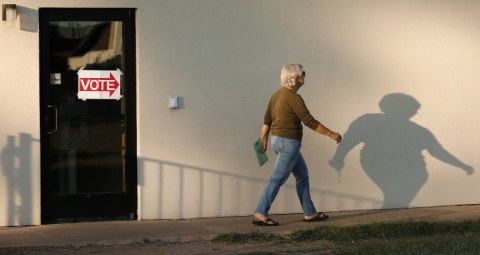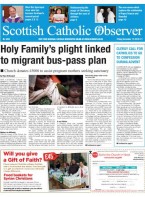December 23 | ![]() 0 COMMENTS
0 COMMENTS ![]() print
print

Calling on politicians to be more accountable
Anthony Horan, director of the Catholic Parliamentary Office, explains his role in equipping lay Catholics to engage with their MPs and electoral candidates on the issues that really matter.
During the recent General Election campaign, the Catholic Parliamentary Office wrote to every parish in Scotland encouraging participation and offering information to voters. We provided a selected voting record of the incumbent MPs and urged Catholics to question all the candidates in their constituency on the fundamental moral issues which deeply concern the Church, together with a range of other issues highlighted in the recent pre-election pastoral letter from the Scottish Bishops’ Conference.
The letter was given added relevance as it was circulated within days of manifesto launches by three of the main parties (Labour, Liberal Democrats and the Green Party) all pledging to decriminalise abortion.
The aim of the letter was threefold: to empower the laity with information about the election, to inform wider society about the issues that matter to the Church and to remind politicians that Catholics take note of how their elected representatives vote and will use this information when deciding whether to support them or not.
Records
The voting records of incumbent MPs are publicly available and shared by many organisations, especially around the time of an election. However, many people are not aware of the fact that this information is in the public domain or are not sure where to find it. Widening the availability of this information and highlighting it to the Catholic laity equips them with relevant information and encourages greater engagement with the democratic process.
The parliamentary voting record of any politician is a matter of indisputable fact and, as is proper in a democracy, they should be held accountable for it to the people whom they represent. There can be any number of reasons why a politician voted in a particular way or decided not to vote at all and it is right and proper that the electorate be given the opportunity to question this, and the politician given the opportunity to defend and explain their actions.
Important issues
The Church’s role is not to tell people how to vote. The Church’s role is to engage the laity on Church teaching, focusing on those issues of importance to the Church and in which the society and culture of the time is engaged. Ultimately, votes in Parliament make laws. Whether politicians vote for or against or abstain, the electorate is compelled to abide by the decisions made by Parliament after the votes have been counted.
Elected representatives bear great responsibility. It is no easy task to represent the interest of thousands of people in Parliament. The issues and votes that they face are fraught with complexities and competing interests, and individual conscience plays a part too. That is why it is so important to encourage more openness and greater engagement between the electorate and those who wish to be elected.
Questioning candidates
Admittedly we can only analyse the voting record of an incumbent MP and not the other candidates in an election who have no voting record. That was why my letter urged parish priests and the laity to question all candidates in their constituency on the issues highlighted in the Bishops’ pastoral letter.
The pastoral letter highlights several issues: abortion, assisted suicide, poverty, climate change, immigration, nuclear disarmament, and more. The Catholic Parliamentary Office encourages the laity to challenge all candidates on these topics. Again, this is to help the laity make an informed choice on polling day and also to highlight the issues the Church believes to be the most critical for our Parliament and government at the present time.
Christian beliefs
Further, the pastoral letter makes it clear that this election presents us with an opportunity to elect an ‘individual representative who reflects as closely as possible our beliefs.’ The Church must always rise above party politics and be careful not to get drawn into battles on party lines. The Church is concerned with promoting Her teaching and encouraging the laity to be partisan for Gospel values, nothing else.
Pope Benedict XVI said that the role of religion in political debate is not to propose concrete political solutions but rather to help purify and shed light upon the application of reason to the discovery of objective moral principles.
This initiative, and the wider work of the Catholic Parliamentary Office, is based on this principle. The Church illuminates the Gospel for all to see; it is for the laity to then take that Gospel message and apply it to social life, including engagement with the political.
To learn more about the work of the Catholic Parliamentary Office, please visit: rcpolitics.org










